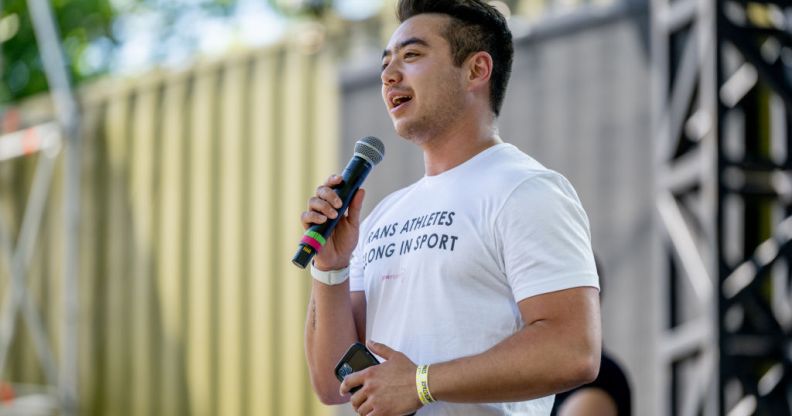Banning trans athletes doesn’t protect anyone – but it will hurt women’s sports

(Roy Rochlin/Getty)
Trans athlete and advocate Schuyler Bailar explains why World Athletics’ ban on trans women will only hurt women’s sports.
In 2015, I became the first openly transgender athlete to compete for any men’s team in NCAA D1 sports. For years, I gave talks ending with: “I share my story as proof that we can all be who we are and do what we love.”
A few years ago, a wildfire of anti-trans state legislation began to render that statement false. To further this, in June of 2022, World Aquatics (formerly FINA) became the first international body to ban trans women from competing in the women’s category. Now, World Athletics has followed suit.
Both these governing bodies predictably cited “inconclusive science” as well as a necessity to “protect the female category” as primary driving factors for their decisions, despite the fact that available evidence does not indicate trans women retain any biological advantage, nor do official reports enumerating actual barriers to women’s sport ever name the inclusion of trans women as an issue.
The alleged intent to “protect the women’s category” coupled with painful inaction except to exclude trans women makes clear the true underlying forces: misogyny and power. If protecting women’s sports were truly paramount, where are the hundreds of bills addressing the rampant sexual assault, the unequal pay, the misogynistic bullying, the lack of financial access, the racism, or any other clearly documented barrier to participation in girls’ and women’s sports?
While World Athletics’ jurisdiction includes only elite-level international competition for track and field, cross country, road running, racewalking, mountain running and ultra running, the ruling cannot be taken as distinct or on its own.

2021 and 2022 saw unprecedented anti-trans legislation across the Unites States, and 2023 has already far surpassed both these records with nearly 500 anti-trans bills introduced in 46 states since the year began. An overwhelming portion of this legislation affects transgender youth’s ability to participate in sports – non-elite, non-professional, non-Olympic, not even collegiate levels. Children’s sports.
Last June, I spent a few days with a handful of young trans athletes, most ranging from 6 to 12 years old. The kids ran around playing, almost carefree. Almost. Their joy was darkened by the knowledge that many would soon return home to a state where they would not be permitted to play alongside their friends – that they, due to their transness, are considered a threat.
“This is what America is afraid of? These tiny children?” I thought as I sat with an especially small 6-year-old trans girl who told me she was going to quit running because otherwise she would be forced to run with the boys next year.
Disguising transphobia and misogyny as “protecting women and children” is an incredibly effective tactic that all but removes humanity and truth from the conversation. Instead of understanding that trans children are among our country’s most vulnerable populations and in need of the most protection, anti-trans rhetoric twists the honest, well-intentioned person’s desire to protect women and children into furthering harmful trans exclusion.
In actuality, bans on trans women athletes do not protect anyone – instead they endanger all women and girls in the category, especially those who are already marginalized.
Excluding trans women demands policing the entire women’s category, measuring every woman’s body against some manufactured prototype of womanhood that is deemed “woman enough” by systems of power (namely the patriarchy and white supremacy).
Women considered “too masculine” because of how they look or how their bodies perform are already at risk of heightened scrutiny and discrimination, and trans athlete bans only exacerbate this. Black women, in particular, are disproportionately affected due to misogynoir – think Serena Williams, Simone Biles, Sha’Carri Richardson… the list goes on.
Anti-trans rhetoric tricks its fearful disciples into believing trans women are the threat and that excluding them is feminism. In reality, the patriarchy – comprised of powerful, mostly white, cis men – are truly the ones brandishing all the weapons.
Bans such as World Athletics’ new ruling are unfair, discriminatory, misogynistic, transphobic, and riddled with anti-Blackness and racism. Trans women do not threaten the women’s category – excluding them does.
Schuyler Bailar is an educator, author, advocate. Follow him @pinkmantaray on Instagram and TikTok and @sb_pinkmantaray on Twitter.
How did this story make you feel?

